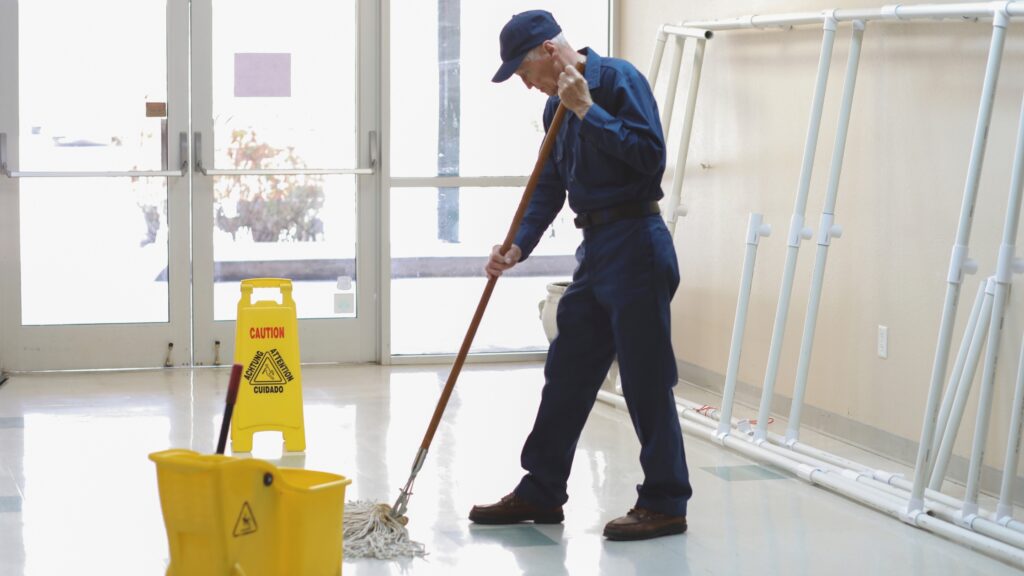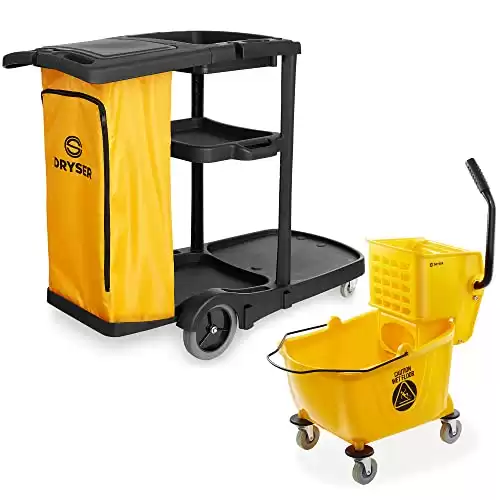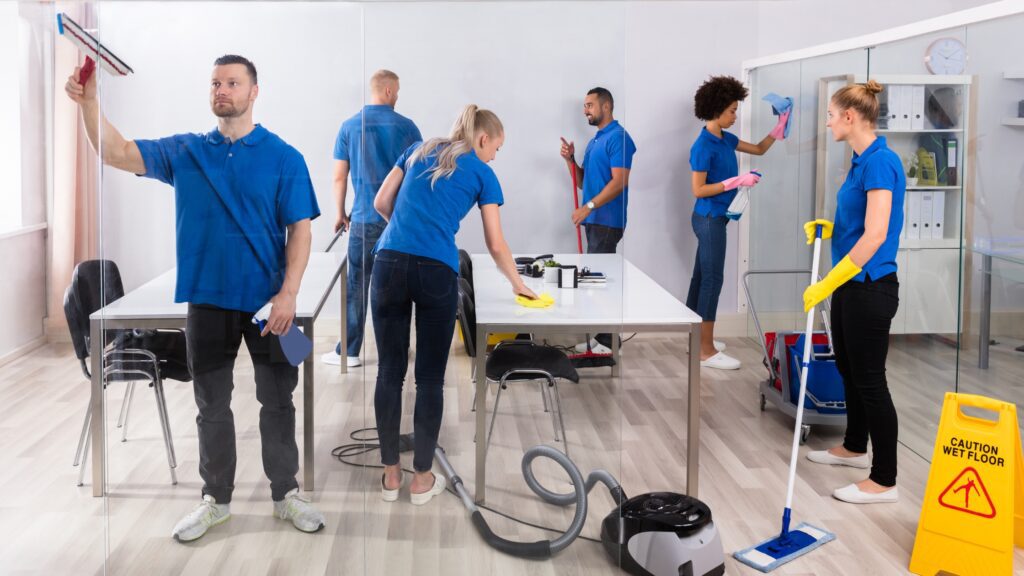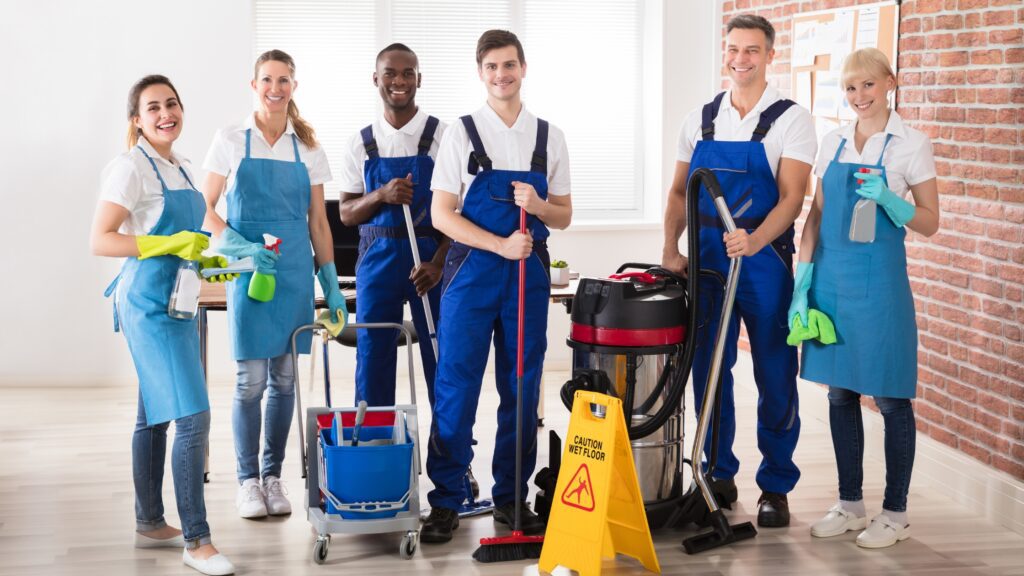For you to comprehend this work more, always think of that janitor when you see them. The variety of tasks and qualifications required of a janitor is generally not known by the public. Thus, this essay will analyze what a janitor does every day ranging from cleaning premises to repair works to keep schools, offices, hospitals, and other buildings maintained.
Table of Contents
ToggleDefining the Role of a Janitor
Keep it Clean
Your main duty as a janitor is maintaining cleanliness at all times. Cleaning floors, windows, and restrooms, emptying garbage cans, and dusting/wiping surfaces are some of your duties. This is physical labor that requires carrying around heavy machines such as industrial vacuum cleaners, mops, and garbage bags. You sweep, mop, scrub, and disinfect the building until it shines while making sure that people have a clean environment in which to live or work.
Maintenance and Repairs
Janitors are not only involved in cleaning activities; they also do basic maintenance and repairs needed for the proper functioning of facilities. Drains may get blocked, bulbs blown out HVAC filters need to be changed among others which form part of this minor maintenance process done by these workers. While doing your tasks some painters can paint walls or regrout tiles if necessary. In case of any equipment breakdowns or system failure, however, janitors are good for temporary measure fixes before professionals come over to fix things properly.
Order and Organization
A good janitor is meticulous and detail-oriented. You develop schedules and checklists to ensure all areas are properly cleaned. Keeping utility closets well-stocked and organized is important too. Janitors have to manage supplies, equipment, keys, and schedules efficiently. You may have to place supply orders, track inventory, and handle budgeting for your department.
A Valuable Role
The roles played by janitors in workplaces, schools, and public arenas are often unappreciated. The environment is maintained clean and functional for the students, employees, and customers. Many people find it worthwhile to perform physically demanding duties because they believe that they provide important services. As a custodian, you get satisfaction from a well-accomplished job of making sure a safe, tidy, and friendly atmosphere exists.
Daily Cleaning Duties of a Janitor
Buildings need daily cleaning and maintenance to function properly; this makes up the daily routine of janitors. This includes:
Cleaning Public Areas
Janitors spend large parts of their day sweeping, mopping, or vacuuming floors in public places such as lobbies, hallways, stairs, and toilets. Additionally, they wipe down surfaces such as sinks, sanitize areas like toilets, and refill hand towels and toilet paper. Their other duties include emptying bins for trash and recycling bins, and ensuring that mirrors are free from smudges or specks while entries remain dirt-free.
Maintaining Classrooms and Offices
Within offices or school buildings, janitors are responsible for maintaining individual rooms or workspaces in an orderly manner. This entails sweeping/mopping floors; vacuuming carpets; wiping down desks/tables; cleaning whiteboards; throwing away garbage; and making sure lights are on. To cover all areas adequately janitors may interchange between rooms/floors on a schedule basis to cater for all areas.
Groundskeeping and Repair
Some janitors also take care of basic landscaping and repairs around the building. This could include mowing lawns, raking leaves, weeding gardens, salting walkways in winter, and minor fixes like unclogging drains or replacing light bulbs. Larger repairs are usually left to maintenance staff, but janitors keep an eye out for any issues that could impact the safety, cleanliness, or functionality of the facilities.
Additional Maintenance Tasks Performed by Janitors
Janitors do more than just sweep floors and empty trash cans. Their job involves various maintenance tasks to keep buildings clean, safe, and in working order.
Repairs and Maintenance
Janitors handle minor repairs and maintenance issues that come up day to day. This could be things like unclogging drains, replacing light bulbs or air filters, oiling squeaky doors or hinges, patching up holes or leaks, and making sure all equipment and fixtures are in working order. They help identify any major issues that require professional repairs to prevent disruptions.
Waste Management
In addition to emptying trash cans and recycling bins, janitors properly collect and dispose of all waste materials. This includes handling compost, secure documents for shredding, and hazardous waste like used batteries, paint, or chemicals. Janitors follow all regulations for waste separation and disposal to do their part for sustainability and safety.
Security
Janitors play an important role in building security and loss prevention. As they go about their work, janitors keep an eye out for any signs of damage, theft, or unauthorized access. They ensure all doors and windows are secured, turn off lights when leaving, and report anything suspicious to the proper authorities. Their diligence and familiarity with the facilities also allow them to respond quickly in emergencies.
Upgrade your janitorial gear with the Dryser Cleaning Cart and Commercial Mop Bucket for top-notch cleaning efficiency!
Skills and Qualifications Needed to Be a Janitor
To be an effective janitor, you’ll need certain skills and qualifications. While the role may seem straightforward, many important attributes will help you excel in this position.
Technical Aptitude
You should be comfortable operating standard cleaning equipment like floor buffers, carpet cleaners, and trash compactors. You may also need to handle simple repairs, so basic mechanical skills are helpful. Familiarity with cleaning chemicals and proper usage/handling procedures are also important for safety and effectiveness.
Time-Management Ability
As a janitor, you’ll typically be working alone and managing your schedule. You need to be able to efficiently prioritize tasks, follow cleaning procedures, and complete all required work within the allotted time. Having good organizational skills will ensure you don’t miss anything and all areas receive proper attention.
Physically Fit
The work of a janitor is burdensome. One might spend long hours standing and pushing heavy equipment, removing garbage bags, washing the floor, and wiping surfaces. You must be in good physical shape to perform these tasks and be able to bend, kneel, reach, and lift 50 pounds repeatedly without difficulty.
Reliable and Responsible
Janitors are often left alone with minimal supervision. Therefore that means you have to be self-motivated come to work on time for your shift, adhere to all rules and regulations in the workplace as well, and work without being reminded of cleaning or maintenance duties that should be done rightly. This way managers rely on janitors to keep facilities in operational condition without being monitored closely.
Adaptable
As a janitor, you may need to do more things or work at different times if necessary. All this means you need to be adaptable when circumstances demand it, learn new things, and lend a hand elsewhere when needed too. It’s an essential characteristic for staff members at the facilities.
What Does a Janitor Do
So there we are! Sometimes it seems like the life of a custodian can go unnoticed but it is one of those vital jobs that keeps our schools, and offices among many other places running every day. We would not make it through without committed cleaners taking care of our surroundings by keeping them as tidy and functional as they should be. Whenever you notice your janitor is busy please give him/her a smile along with thanks for his effort which ensures our safety and enhances healthy living conditions around us.
Frequently Asked Questions
What Does a Janitor Do on a Daily Basis?
A janitor’s daily duties include cleaning floors, windows, and restrooms, emptying trash cans, and dusting surfaces. They also perform basic maintenance tasks such as changing HVAC filters, unclogging drains, and replacing light bulbs to ensure the facilities remain clean and functional.
What Skills Are Required to Be a Janitor?
To be an effective janitor, you need technical aptitude for operating cleaning equipment, good time-management skills, physical fitness, reliability, and adaptability. Basic mechanical skills and knowledge of cleaning chemicals are also important.
What Maintenance Tasks Does a Janitor Handle?
Janitors handle minor maintenance tasks like unclogging drains, replacing light bulbs, and oiling doors. They may also perform minor repairs such as patching leaks or holes and ensuring equipment is in working order. Major repairs are usually left to specialized maintenance staff.
How Do Janitors Contribute to Building Security?
Janitors play a crucial role in building security by keeping an eye out for signs of damage, theft, or unauthorized access. They ensure doors and windows are secured, lights are turned off when not in use, and report suspicious activities to the authorities, contributing to overall safety.
Why Is the Role of a Janitor Important?
The role of a janitor is vital in maintaining a clean and functional environment in schools, offices, hospitals, and other buildings. They ensure that spaces are safe, tidy, and pleasant, which supports the well-being and productivity of students, employees, and visitors.










